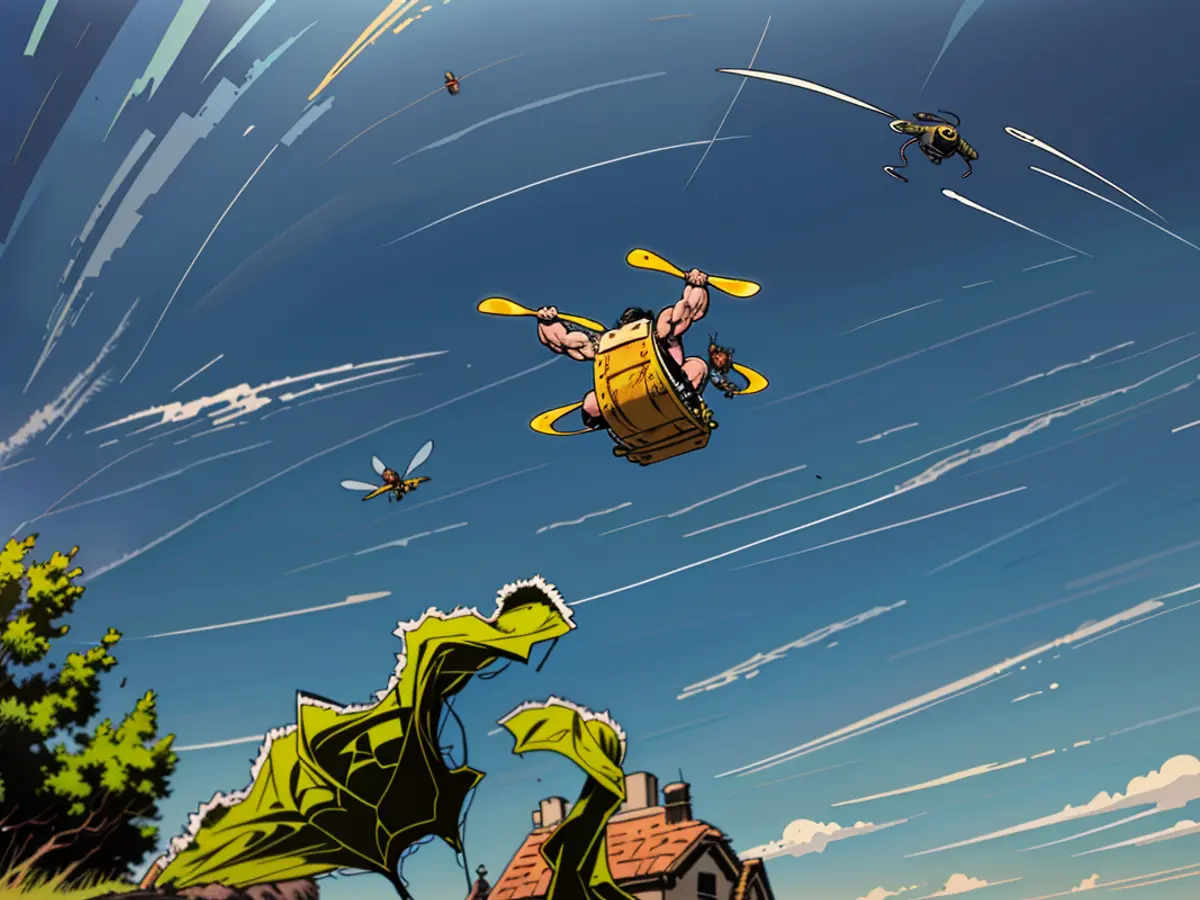A South African winery employs the strategy of deploying predatory wasps via drones, aiming to safeguard its grape crop from infestations.
The venture is being conducted by SkyBugs, a collaborative endeavor between FieldBUGS, a Cape Town-based business that provides the predatory insects, and agritech firm Aerobotics, which works with a group of drone operators to distribute the bugs effectively.
Predatory wasps have become quite popular for pest control in various regions, including South Africa. As per Matt Davis, head of mapping operations at Aerobotics, SkyBugs' drones fly around 30 meters above the vineyard, carrying a "motor-driven device outfitted with a cartridge." As the engine turns, a plastic film unrolls, discharging wasp larvae (the stage between larva and adult).
Each mission covers approximately 20 hectares, and 500 Anagyrus wasps, native to South Africa, are released per hectare before the drone descends so the team can replace the battery and insect cartridge. Data is also gathered using an app.
The wasps' target is the bothersome mealybug, which can spread the damaging vine disease known as leafroll virus, causing harm to the total grape harvest.
For farmers, identifying the virus and managing mealybugs can be costly, time-consuming, and labor-intensive. SkyBugs argues that aerial drone application is quicker and significantly more cost-effective than spraying insecticides, which can be harmful to the environment and beneficial insects like pollinating bees.
Following the release, adult wasps emerge and are drawn to the mealybugs' pheromones. The wasps lay eggs inside the mealybugs, consuming them from the inside out—a process known as parasitizing—leaving their host hollow and dead.
According to Rudolf Kriel, viticulturalist at Vergelegen, "The leafroll virus has practically been eliminated on the farm."
Nurturing the predator's habitat
The Vergelegen team has been collaborating with virologist and leafroll virus expert Gerhard Pietersen for more than 20 years. Previously a professor at the University of Pretoria and Stellenbosch University, Pietersen established a biotech company called Patho Solutions to continue combating agricultural diseases.
"Grapevine leafroll associated virus-3 (GLRaV-3) or 'Type three' is an extremely harmful virus in grapevines," explains Pietersen. "The virus reproduces itself within the plant's vascular system, preventing the nutrients from circulating. The virus's weakness is that its only natural host is the grapevine. Not all plant viruses have such host limitations."
"The result of infestation is that the grapes on the bunch ripen unevenly, failing to reach the desired color and taking a long time to accrue the necessary sugar for winemaking," he adds.
Upon a vine's infection, signs of the virus can be observed with the naked eye. The leaves turn red in autumn and reveal green veins, followed by a slight drooping of the leaves.

"Attempts to remove an infected vine and replace it with a new one can prove ineffective if pieces of the infected vine are left behind in the soil," says Pietersen.
He suggests that the best way to control this virus is "to remove all infected vines in a vineyard along with managing the mealybug vector. This is best done across an entire estate, but this is not economically feasible as the initial costs to start over are very high."
Using wasps to eradicate the virus could be an effective solution, as they are native to the area and should not have any unintended consequences upon releasing increased numbers to the vineyards, he says. "The wasps only feed on mealybugs and then die."
Farmers in the region, cultivating fruits like apples, pears, and citrus fruits, have been employing drones to deploy predatory insects in their orchards for pest control.
A significant market segment
South Africa ranks among the 10 largest wine producers globally, harvesting approximately 1.2 million metric tons of grapes in the previous season and employing nearly 270,000 individuals across the value chain, as per Vinpro, a non-profit representing nearly 2,600 South African wine producers, cellars, and industry stakeholders.
Vinpro describes the leafroll virus as detrimental to the wine industry, which also faced a reduced harvest during 2022-2023 due to weather conditions.
Rudolf Kriel, viticulturalist at Vergelegen, explains that a healthy vineyard can remain productive for more than 20 years, but a vine infected by leafroll Type-3 virus will only last half that time and bear little to no yield in its final years.
Vergelegen maintains a program of various methods to control the virus, and Kriel says its records demonstrate less than 0.05% of leafroll virus infestation in red grape varieties and less than 0.3% in white varieties. "The leafroll virus has virtually been eradicated on the farm," he says.
Pietersen adds that Vergelegen is "regarded as the model estate worldwide for controlling leafroll disease in an environmentally sustainable manner."
Managing the virus could offer benefits beyond improving grape yields; it could enhance the quality of the wine as well. According to a blind taste test conducted by the University of Stellenbosch, using grapes picked from both infected and healthy vines, "the freshness seems to be evident in the wine produced from healthy vines," Pietersen says.

The wasps' effectiveness in controlling mealybugs and the resulting leafroll virus isn't limited to vineyards, as farmers in the region cultivating fruits like apples, pears, and citrus fruits have also started using drones to deploy predatory insects for pest control in their orchards.
The successful eradication of the leafroll virus in South African vineyards, as seen in Vergelegen, could potentially boost not only grape yields but also the quality of the wine produced, as a blind taste test at the University of Stellenbosch revealed that wine from healthy vines exhibited a greater sense of freshness.







